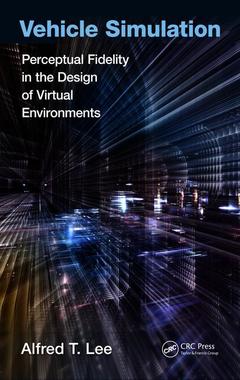Vehicle Simulation Perceptual Fidelity in the Design of Virtual Environments
Auteur : Lee Alfred T.

This book covers the problem of fidelity in the design of virtual environments with specific reference to the design of vehicle simulators. The default design goal has been on the physical replication of a given real-world environment and, in the case of vehicles, the specific appearance and function of vehicle components. This book discusses that perceptual, rather than physical, fidelity of a virtual environment, should be the design goal and the principal purpose is to produce human behavior. This book provides the rationale and design guidance to maximize perceptual fidelity in the development of virtual environments, and therefore maximize the costeffectiveness as well.
Preface
About the Author
Chapter 1 The Problem of Fidelity
Chapter 2 Vision
Chapter 3 Physical Motion
Chapter 4 Manual Control—Force Perception
Chapter 5 Multimodal Perception and Vehicle Control
Chapter 6 Quantifying Perceptual Fidelity
Chapter 7 Implications for the Design Process
Index
Dr. Alfred T. Lee has been involved in the research and development of vehicle simulators for more than thirty-five years and is the author of more than three dozen article in the field. He is also the author of the 2005 book on flight simulation. He is currently president and principal scientist with Beta Research, a company which conducts research and development in virtual envionments. Formerly he was senior research psychologist at NASA-Ames Research Center, responsible for initiating, planning, and conducting research programs in human-systems integration including the development of flight simulators.
Date de parution : 11-2017
15.6x23.4 cm
Disponible chez l'éditeur (délai d'approvisionnement : 14 jours).
Prix indicatif 159,60 €
Ajouter au panierThèmes de Vehicle Simulation :
Mots-clés :
Perceptual Fidelity; Multimodal Perception; Vehicle Simulator; Human-Systems Integration; Optic Flow; Human Factors; Vehicle Simulator Designer; Flight Simulators; Driving Simulators; Manual Control; Perceptual Cues; Human Performance; Sensory Fidelity; Motion Platform System; Optic Flow Pattern; Visual Imaging System; Perceptual Estimates; Stewart Platform; Physical Fidelity; Motion Cueing; Optic Flow Field; Driver Eye Height; Motion Platform; Display FOV; Pedal Force; Arc Min; Force Perception; Motion Parallax; Postural Control System; Torque Feedback



